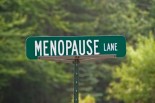If you're starting to get to an age when perimenopause is nearing, you might be experiencing some odd symptoms such as fatigue or mood swings.
But, these symptoms may not click in your brain as "Oh, I'm starting 'the change'."
Menopause is such a variable process. According to Dr. Mary Jane Minkin, head of Yale University’s OBGYN Department, the average age a woman goes through menopause is 51. But, five percent are done with menopause by age 45. Some won't finish menopause until age 59 or older.
What can you do to prepare yourself for this inevitable transition?
Dr. Minkin says it all really comes down to taking excellent care of yourself. Eat a healthy diet. Try to get as close to your ideal body weight as you can; heavier women have worse hot flashes. Stop smoking! Women who smoke go through menopause 1-2 years earlier and also have worse hot flashes. Alcohol can bring on hot flashes as well, so manage your intake.
As your estrogen levels decrease, your bone health is also affected. Exercise, particularly weight-bearing exercise and getting sufficient amounts of calcium can help stave off any bone-related troubles.
One tip that many women may not think of is to keep your room temperatures cool at night to help with night sweats. And, place an extra set of PJs next to your bed in case you wake up drenched. Then, you can easily swap the sweaty ones for fresh and dry ones.
Vaginal dryness can be a major symptoms of perimenopause and menopause, but there are many OTC options to help maintain moisture in the vagina, as well as lubricants to make sexual intercourse more pleasurable.
Listen in as Dr. Minkin shares some more strategies and tips for dealing with menopause symptoms.

Perimenopause & Menopause: Hormones, Nutrition & Intimacy
Guest
: Mary Jane Minkin, MD
From the Show: Wellness for Life
Summary: Menopause is such a variable process. What can you do to prepare yourself for this inevitable transition?
Air Date: 10/9/15
Duration: 10
Host: Susanne Bennett, DC
Απολαύστε την εμπειρία ενός ζωντανού καζίνο με πραγματικούς ντίλερ στο Infinity Casino, προσφέροντας παιχνίδια όπως Live Blackjack και Live Roulette.





